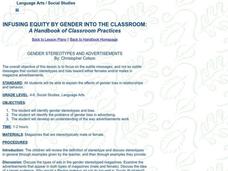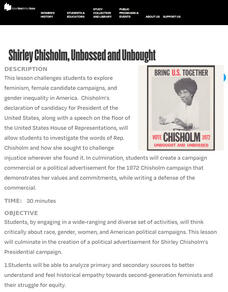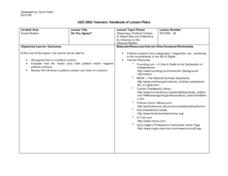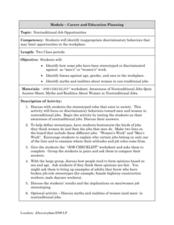Curated OER
First Nations in the Media
Students analyze the portrayal of Aboriginal people in the media. In this stereotype identification lesson plan, students investigate the ways the media represents Aboriginal culture. Students use the Internet to research, and present...
Anti-Defamation League
Nothing Wrong with a Three-Legged Dog: Discussion Guide for Grades 3-5
Scholars study the book, Nothing Wrong with a Three-Legged Dog by Graham McNamee to encourage an antibullying trend in their school and community. Chapters and themes examine bias, coping skills, how to respond to bullying, and being a...
American Press Institute
In the Newsroom: The Fairness Formula
Reporting the news is easy, right? Think again! Show young scholars the difficult choices journalists make every day through a lesson that includes reading, writing, and discussion elements. Individuals compare the language and sources...
Media Education Lab
Propaganda Techniques
In an age of fake news, alternative facts, and biased reporting, it is more important than ever that 21st century learners develop the critical-thinking skills necessary to recognize, analyze and resist the propaganda techniques used in...
Facing History and Ourselves
The 1968 East LA School Walkouts
The East LA School walkouts are the focus of a lesson that looks at the importance of an education that honors the culture of all learners. Class members watch videos and read an article on the LA student demands to gather background...
Media Smarts
TV Dads: Immature and Irresponsible?
Examine gender stereotypes on television, focusing on fathers portrayed in sitcoms and advertising. Questions on a handout direct learners to consider the types of fathers they see on television and one advertisement is highlighted as...
Described and Captioned Media Program
Malcolm X: Make It Plain, Part II
Track the transformation of Malcolm Little into Malcolm X and then into El Jajj Malik El-Shabazz with the second part of Make it Plain, a documentary on the famous civil rights activist. Viewers consider not only how events shaped and...
Encyclopedia Britannica
Candidate Flip-Flop or Evolution?
Beware political rhetoric! Connotation is everything! Groups select a presidential candidate and investigate how the candidate's position has changed on a specific issue. After analyzing the situation, the group determines whether they...
Curated OER
Infusing Equity by Gender into the Classroom
Students identify gender stereotypes in magazine advertisements. In this gender bias lesson plan, students discuss the problems of gender bias in advertising and develop an understanding of the way advertisements work.
Newseum
Is This Story Share-Worthy?
Young journalists use a "Is This Story Share-Worthy?" flowchart graphic to decide whether a story is worth sharing online. Instructors provide groups with fake news, poor quality stories, opinion pieces, biased news, and high-quality...
Facing History and Ourselves
Citizen Watchdogs and the News
To conclude their case study of media coverage of the shooting of Michael Brown by a Ferguson, Missouri, police officer, class members consider the role of citizen watchdogs in a democratic society, develop strategies for combating...
Museum of Tolerance
Influence of Media
We are bombarded with media images expressly designed to influence viewers. Learning how to analyze the intended effects of these images is essential and the focus of an activity that asks viewers to use the provided questions to guide...
Crafting Freedom
F.E.W. Harper: Uplifted from the Shadows
Young historians discover the life of an incredible African American woman who, as an anti-slavery lecturer prior to the Civil War, defied stereotypes of what women could accomplish. Pupils explore the concept of stereotyping, read...
Library of Congress
The Emancipation Proclamation and the Thirteenth Amendment
How did the Emancipation Proclamation lead to the Thirteenth Amendment? Middle schoolers analyze primary source documents including the text of the Emancipation Proclamation, political cartoons, photographs, and prints to understand the...
iCivics
Drafting Board: Interest Groups
Does the influence of interest groups harm a political system? Your class members will analyze the role of interest groups in American politics, as well as consider the effect of perspective, bias, loyalty, and the First Amendment.
National Woman's History Museum
Shirley Chisholm, Unbossed and Unbought
An engaging resource introduces young historians to Shirley Chisholm, the woman, the Black congresswoman, the activist, and the candidate for President in 1972. Class members study primary sources, watch a video of her announcing her run...
Curated OER
Gender Role Development
Young scholars look in newspapers and magazines and discuss gender role development and stereotypes. For this gender lesson plan, students bring in their favorite objects that have no gender stereotype linked to it.
Curated OER
Courage of the Heart
Learners research discrimination and how people fought against for the common good. In this discrimination lesson, students watch a movie about Alfred Blalock and Vivien Thomas. Learners generate a list of words about discrimination....
Curated OER
News Journalism Across the Media: Introduction
Although students are aware of news as information that influences their perceptions of the world, they are often unaware of the various ways to present that information. Encourage them to investigate, discuss, analyze and make valuable...
Curated OER
Do You Agree?
High schoolers recognize bias in a political cartoon, evaluate how the media uses both positive and/or negative political cartoons, and assess the influence a political cartoon can have on a person.
Curated OER
Nontraditional Job Opportunities
As your learners prepare to enter the workforce, address some common stereotypes that may be limiting their professional goals. The class brainstorms gender-stereotyped careers, exploring where those ideas originate. They complete a job...
Curated OER
Stereotypes
Assumptions and misconceptions are two things that underlie stereotypes. Introduce youngsters to the concept of stereotyping with a role-play activity. They pretend they are employees at a restaurant who have accused a person of...
Curated OER
Understanding the Influence of the Media
Critically analyze advertising techniques, such as circular reasoning, bandwagon, testimonial, and repetition, with worksheets that effectively discuss and illustrate how the media aims to influence.
Curated OER
'And Maybe I Can Change That Too'
Students consider their own prejudices and stereotypes. In this social justice lesson, students monitor their own reactions to people who are different from themselves. Students watch a video featuring Toni Morrison that presents a...

























